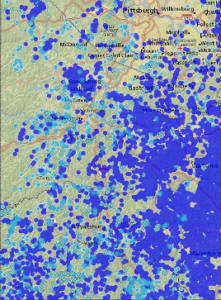
At the direction of Gov. Tom Wolf, the Department of Environmental Protection (“Department”) conducted and released a report that reviewed the Department’s oversight of the Commonwealth’s conventional oil and gas industry. Pennsylvania distinguishes conventional and unconventional wells based on depth. A conventional gas well is one that produces oil or gas from a conventional formation. These conventional formations occur both above and below the Elk Sandstone, whereas an unconventional gas well is a well that is drilled into an unconventional formation. An unconventional formation is a geologic shale formation below the Elk Sandstone (or geologic equivalent). The goal of the report was to articulate what the Department can do, has done, and what suggestions it can offer to properly fulfill its role as the state regulator of the conventional oil and gas industry. The findings in the report do not provide an optimistic view of how the conventional oil and gas industry has operated in Pennsylvania.
This report looked at the environmental compliance of the conventional oil and gas industry between 2017 and 2021. Here are a few data points that stood out: The number of conventional wells inspected fell over the five years from 11,888 to 8,780, respectively. However, the number of violations issued increased from 3,286 to 4,469. Even though fewer inspections were conducted, more violations occurred at each site. The most frequent violation found was the failure to plug the well upon abandoning it. Other findings were that over 56% of conventional oil and gas operators failed to report the amount of waste they generated and how it was disposed of. Over 59% of operators failed to report the mechanical integrity of their wells, suggesting that an increased number of operators are unaware if their wells are or are not leaking fluids into groundwater, surface water, or natural gas into the air.
The Department reported that compliance with the state’s conventional oil and gas industry is “troubling.” It was shared that there is a “significant non-compliance” with industry concerning current laws and regulations that oversee the conventional oil and gas sector. Some of the more concerning findings include the number of improperly abandoned wells and reporting of hydrocarbon and waste production. The Department stated that “…failure to report seems to be an industry-wide rule rather than the exception.” Abandonment of wells is especially troubling for several reasons. Pennsylvania law requires that all oil and gas well operators properly decommission their wells at the end of the well’s useful life. Unplugged abandoned wells create a pathway for subsurface gasses or liquids to migrate into the groundwater, soil, or to the surface. Unplugged abandoned wells may also leak gasses into the air, particularly methane. Deterioration of the steel casing surrounding the well bore – or the cement surrounding the casing – opens this pathway for migration. Unplugged abandoned wells also constrain land use. Foregoing construction on and investment in land with unplugged wells has broad implications for community well-being because it suppresses the local tax base that funds local schools, roads, and other services. Plugging wells and restoring their sites addresses these problems. Conventional oil and gas operators’ failure to take financial responsibility for plugging their wells exposes the Commonwealth (meaning taxpayers) to the risk of having to pay plugging costs for these wells.
The Department was candid in its findings, sharing that the resources and enforcement tools available to it “have not made an appreciable dent in compliance rate and numbers over the past five years.” It also indicated in the report that a “significant change in the culture of non-compliance as an acceptable norm in the conventional oil and gas industry will need to occur before meaningful improvement can happen.” Yet, a common theme within the report was that the Department was hopeful that with additional resources, it could turn the current climate within industry around. The Department has avenues it can take to address these issues. It says that it just needs more stable funding and staffing to do it. While we agree that adequate funding and staffing would likely result in some improvement, the Department must be willing to exercise its full authority to force conventional operators to comply with existing law. Additional inspections alone won’t change the “culture of non-compliance” – it may just reveal additional violations.
Lastly, the Department explains how regulatory reform could also help protect the health and safety of both the residents and the environment of the Commonwealth. The rulemaking, which is not published yet, would amend Chapter 78 to modernize environmental protection standards related to conventional oil and gas activities. Highlighted changes in the rulemaking would include impact screening and water supply replacement standards (including pre-drilling surveys). Other aspects would ensure impoundments, waste management and disposal, borrow pits, standards for reporting spills and releases, and underground injection control wells all see updated environmental standards. The Department finishes the report by calling out the General Assembly for significantly limiting the Environmental Quality Boards’ authority to change bond amounts. Current bond amounts are inadequate and expose the Commonwealth to the risk of having to pay plugging costs for many abandoned wells. Again, a scheme which puts the taxpayer largely on the hook for our state’s growing inventory of abandoned wells.

